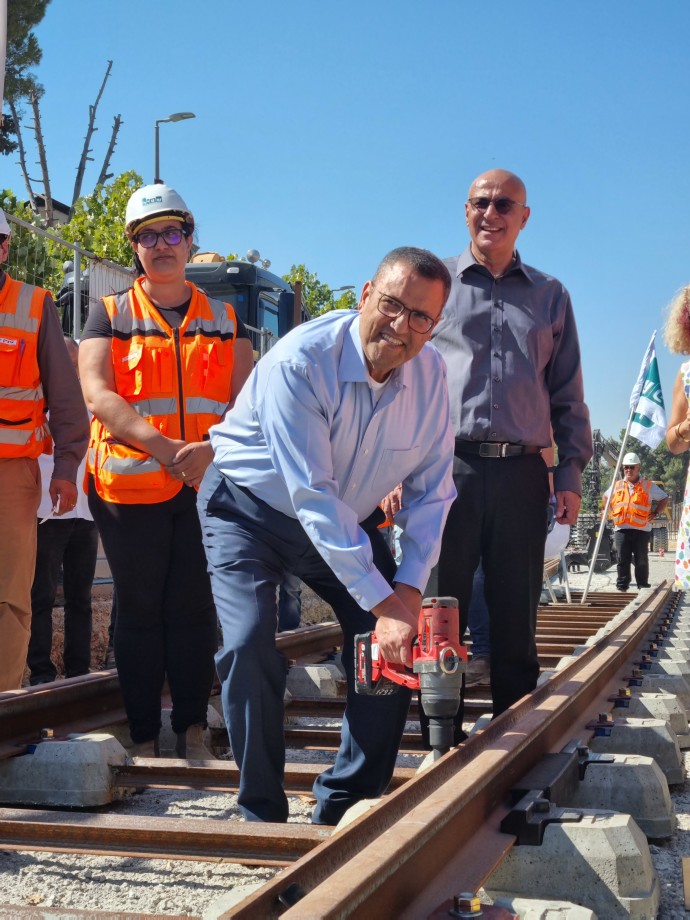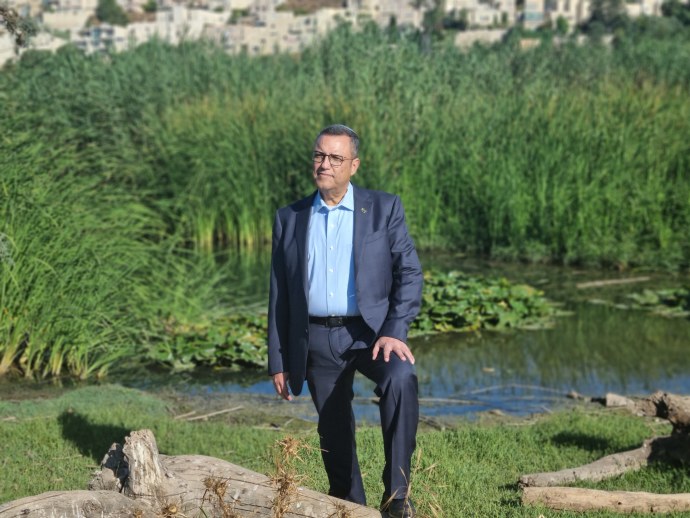Entering the spacious office of Jerusalem Mayor Moshe Lion, the first thing I hear is the crackling of sunflower seeds emanating from the mayor’s large-palmed hands as he stands in conversation with an associate. His business concluded, the visitor departs, while Lion, wearing his trademark blue tie and white, long-sleeved shirt, returns to sit at his tidy desk as our interview begins.
“I believe that Jerusalem is in the midst of a revolution,” the mayor begins, adding that his ultimate goal is to turn the capital into a magnet for all of Israel’s citizens and for Jews throughout the world. In order to realize this dream, Lion says that the city needs to build more housing, add more workspace for businesses and improve transportation services.
“Over the past 15 years,” Lion explains, “between 2,000 and 2,300 apartments were built each year in Jerusalem. We are now building 6,000 apartments annually, almost triple the previous average. In 2021, we built 5,400 units. In 2022, we will complete 6,000 units, and the numbers will be even greater in 2023. We must give young couples and families who want to live in Jerusalem the ability to purchase apartments.”

Lion adds that of the total number of apartments that are being built, between 1,500 and 2,000 units will be rentals that will be constructed in Pisgat Ze’ev, the Tzomet Pat region and the city center.
With the new housing that the city expects to add in the next several years, additional working space will also be needed in Jerusalem. To that end, says Lion, the city is adding 1.6 million square meters of office space for businesses. “When I took office,” he says, “there was a total of four million sq.m. of office space in the city. We are now expanding this space by almost 50%. We are building in Har Hotzvim, near the city entrance, in Givat Ram and in other areas throughout the city.”
Lion says that two biotech companies and two computer firms will be moving to Jerusalem in the near future. He expects that other companies will follow suit and move to the city to stimulate local employment, while benefiting from the capital’s ecosystem of talent, such as students from Hebrew University and Hadassah Medical Center personnel.

The mayor then discussed the subject that has perhaps affected Jerusalemites more than any other – the constant traffic. “In the past year, Jerusalem is finally emerging from its traffic jams,” he says. Lion notes that the extension of Jerusalem’s Red Line light rail to Hadassah and Neveh Yaakov will be opening this coming May, significantly reducing the traffic burden. “Anyone who wants to go to Hadassah Ein Kerem will prefer to travel via the light rail rather than worry about finding parking,” he says.
Lion adds that the municipality is also working on the construction of the Green Line light rail system from Gilo to Mount Scopus, which will pass through Tzomet Pat, Givat Mordechai, Binyenei Ha’uma and Bar Ilan Street.
“Currently,” he says, “the light rail services 250,000 riders per day. When these lines open, the number will increase to 500,000 riders per day. This is a significant number that will greatly lessen traffic jams. Anyone who does not want to get involved with traffic jams will take the light rail. It is ‘greener,’ and it will be faster because trains will come every few minutes.”
‘Jerusalem is finally emerging from its trafic jams’
Moshe Lion, Jerusalem Mayor
The Jerusalem Municipality has already begun work on the light rail’s Blue Line, which will travel between Gilo and Ramot, passing through Hebron Road and Keren Hayesod, Emek Refaim and King George streets en route to Ramot.
Lion also speaks highly of the recently opened Highway 16, which provides direct access to the southern and central sections of the city from the west. “This new road shortens the travel time to Jerusalem, and we are also seeing a significant decrease in traffic at the main entrance to the city from Highway 1,” he says.
These three factors – additional housing, more jobs and better transportation options – will attract greater numbers of people to the city, the mayor says. He adds that Jerusalem’s educational system is an attraction for young families, as 25 of the city’s high schools are listed among the top 100 schools in the country.
Lion next turns his attention to the eastern section of the city. He mentions the Jack, Joseph and Morton Mandel Community Sports Center that is being built in Beit Hanina as an important addition for residents.
The municipality’s Silicon Wadi plan will establish an innovation quarter for hi-tech companies in east Jerusalem
“This is the first sports center the city has built in east Jerusalem since 1967,” he says. “I am delighted that the municipality is involved in this project because previous administrations have not invested sufficiently in the eastern side of the city. I am working hard to invest more in east Jerusalem in sport and societal infrastructure and schools in order to provide an educational system that will offer Israeli matriculation exams (bagruyot) that will enable graduates to continue in higher education.”
Of particular interest to the mayor is the municipality’s Silicon Wadi plan, which is intended to establish an innovation quarter for hi-tech companies in east Jerusalem. The project provides for the construction of multi-storied office towers covering 127,000 square meters in the Wadi Joz neighborhood, with the city soon receiving construction permits from the district committee. Lion says that entrepreneurs have committed to the construction of two of the towers. He estimates that the project will be completed within the next three to four years.
Lion states that the city has already rented office space on Salah Al-Din Street for hi-tech employment for residents of east Jerusalem. He says that the city conducted a survey and found at least 1,000 young Arabs in east Jerusalem who have trained in hi-tech but cannot find work in the field. “Many residents of east Jerusalem are not finding work in hi-tech in the western part of the city,” he says; “but if we build a hi-tech center for them in the city’s eastern section, it will be much easier for them to find work.”
Given that the world has recently seemingly emerged from the coronavirus pandemic, it is only natural that the mayor extends a blessing of good health in the New Year for the city of Jerusalem. “We have experienced two difficult years, but the hotels are at full capacity for the holidays. Many Jews who waited for the end of corona are coming to Israel. It is my hope that the entire Jewish people will return to Jerusalem.”
As our interview comes to a close, Lion avers that heading the city of Jerusalem is the most challenging mayoral job in the world. “It is a job that comes with many challenges. When Jerusalem is quiet and peaceful, then the situation for the entire Jewish people is peaceful. If, God forbid, things are not calm in Jerusalem, then the situation for the Jewish people will also be unsettled,” he said.
“I am trying to ensure that Jerusalem is good for its residents, and that the entire Jewish people will rejoice in its positive position.”
This article was written in cooperation with the Jerusalem Development Authority.
